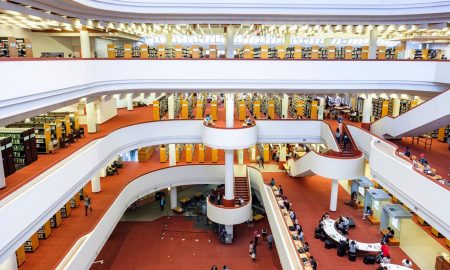June 17, 2018 – I have a Toronto library card which gives me access to a collection containing over 10 million books, ebooks, CDs, DVDs, newspapers, magazines, and hundreds of computers located in 100 branches across the city. The collection covers 40 different languages and in the latest public library system rankings stands in the top 10 globally according to Heinrich Heine University Dusseldorf. Researchers there compared 30 major cities around the world with Canada finishing in the top 10 in three: Vancouver, Toronto, and Montreal.
Public libraries around the world have had to adapt to the disruptive change brought on by the Internet and search engines like Google. The physical collection is no longer the sole purpose of a library. Toronto’s main downtown reference library offers its members (all free if they can provide proof of an in-city address) access to 3D printers, robotic kits, self-publishing tools, a podcasting studio with green screen, scanners, and a wide array of software tools.
States Vickery Bowles, head librarian, “In the 21st century, we’re increasingly dependent on access to online services, and understanding of and comfort with that technology.” And people in Toronto have responded to the library’s continuing evolution with more than 70% of the city’s population using its services.
The downtown reference library includes a 575-seat theatre. Branches contain meeting rooms for local community activities, guest lecturers, and performance artists. Most of the events are free and next to impossible to get in if you don’t plan ahead. That’s how popular the venues have become.
The success of Toronto and the two other Canadian cities is in marked contrast to libraries in many other countries where branches are being closed by the hundreds and visits and circulation continue to decline.
When reading material is available online who wants to visit a library? Faced with that challenge Toronto and a few other cities have turned libraries into end destinations, happening places, attractive to young and old alike. A visit to Toronto’s reference library includes an opportunity to drop into the onsite cafe for a meal and a coffee. The library is a spacious and attractive place, no longer just a physical book repository.
At the two local branches nearest me, I reserve books I want to read online and am notified when to come and pick them up. If I haven’t finished reading a book I’ve taken out (a generous two weeks on loan), I can go online and extend my return date.
The library system in Toronto is publicly funded but even that model is changing as digital-age companies see the benefit of forming partnerships with an accessible learning repository that is a draw for those who seek information in a physical rather than online space.
Back in 2013 when I last tackled the subject of libraries, I talked about a library in San Antonio, Texas, that planned to open without physical books. This public library located in Bexar County was seen as the future of the institution. It wasn’t the first of its kind. Cushing Academy, a school in Massachusetts had gotten rid of all its books, a 20,000 volume library collection, in 2009, and replaced them with Amazon Kindles and access to millions of titles. The University of Texas had opened a bookless library in 2010. And there are others as well in a number of locations across the United States. So I was certain that the library as I knew it was soon to be doomed as cities and academia adopted these digital paradigms.
But Toronto, Montreal, and Vancouver’s public libraries tell a different story. In these spaces libraries with physical books continue to thrive and flourish in the 21st century. And they are doing it by embracing new technologies, making them public learning hubs, centers for discussion, places filled with the latest in digital and robotic technology, and finding new partners among the creators of the tools that underlie and deliver digital information via the Internet.

















[…] Canada’s Public Libraries at the Forefront of the Digital Revolution […]